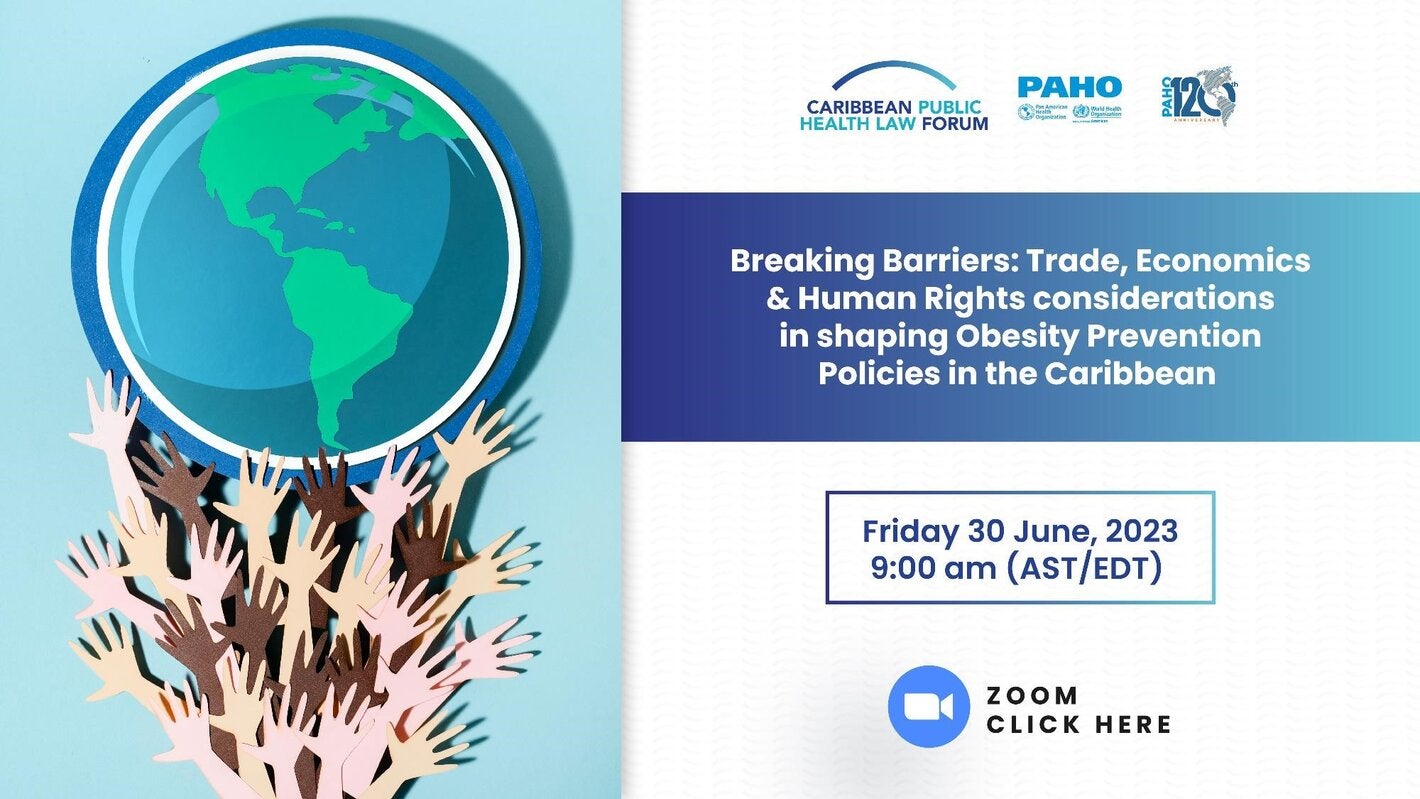
Join us for the webinar Breaking Barriers: Trade, Economics & Human Rights considerations in shaping Obesity Prevention Policies in the Caribbean, that will be hosted on Friday 30 June at 9:00 a.m. (AST/EDT). The webinar, held jointly with the Caribbean Public Health Law Forum, aims to promote further dialogue on the WHO/PAHO evidence-based policy recommendations on the nutritional warning system and the latest evidence addressed in the recent British Medical Journal publication: “Effects of front-of-package nutrition labelling systems on understanding and purchase intention in Jamaica: results from a multiarm randomized controlled trial”.
The session will also present the latest evidence on the performance of FOPL systems and will provide the latest published research that responds to commonly asked questions about the nutrition warning system and the trade, economical and legal implications for the Caribbean.
The webinar series will bring together academics, senior policymakers in the field of health, finance, trade and civil society from the Caribbean, Canada, Europe and Australia.
How to participate
- DAY: Friday, 30 June 2023
- HOUR: 9:00 AM (AST/EDT) [check local times in other cities at the end of the page]
- REGISTER HERE: https://paho-org.zoom.us/j/89192425075?pwd=UGZmL3RsWjRsektKS2FPZ3AzT0NrZz09
- After registering, you will receive the information to connect to the panel.
- LANGUAGE: The event will be in English.
Agenda
Moderators:
- Fabio Gomes, Advisor, Nutrition and Physical Activity, PAHO
- Shana Cyr-Philbert, Senior medical officer & NCD Focal Point, Ministry of Health and Wellness & Elderly Affairs & Caribbean Public Health Law Forum
Introductory remarks. Dean Chambliss, Subregional Program Director, Caribbean, PAHO
Presentations:
- International trade agreements and the protection of public health [DOWNLOAD]
- Wolfgang Alschner, MA, LLB, JSM, PhD, Hyman Soloway Chair in Business and Trade Law, University of Ottawa
- International trade and law and the protection of public health in the Caribbean [DOWNLOAD]
- Nicole D. Foster LL.B, LL.M (Cantab.) LL.M (WCL). Law Lecturer & Head, Law & Health Research Unit, University of the West Indies
- Public health policy making and legal and human rights frameworks [DOWNLOAD]
- Benn McGrady, LLB, LLM, PhD, Unit Head, Public Health Law and Policies, Health Promotion Department, WHO
- Relevance of obesity prevention policies for Caribbean citizens, especially youth
- Pierre Cooke, Jr., LLB (Hons), Healthy Caribbean Coalition Youth Voices Technical Advisor & Member, Caribbean Public Health Law Forum
- Presentation: Front-of-Pack Warning Labels. A foundational and enabling policy for healthy food environments [DOWNLOAD]
- Fabio S Gomes, Advisor, Nutrition and Physical Activity, PAHO
Background
High blood pressure, high fasting blood sugar levels, and overweight/obesity are the top three risk factors for mortality in the Americas. Mortality rates show that at least half of all annual deaths in any Caribbean country result from NCDs. At the same time, the Caribbean is experiencing an increasing trend of childhood obesity which suggests that the NCD disease burden is likely to worsen in the coming decades. Unhealthy eating is closely linked to these top three risk factors driven largely by excess intake of sugars, total fats, saturated fats, trans fats, and sodium. The excess intake of these nutrients has been driven largely by the widespread availability, affordability, and promotion of processed and ultra-processed food products that are excessive in sugars, fats, and sodium. As such, an essential part of the solution requires the use of laws and regulations to reduce the demand for and offer of products that contain excessive amounts of critical nutrients.
One of the key policy tools to regulate such products to prevent them from unbalancing diets is the use of front-of-package labeling (FOPL) to indicate to consumers which products contain excessive amounts of sugars, total fats, saturated fats, trans fats, and sodium. To support countries in the Americas in their efforts to meet the World Health Organization recommendations and protect them from the top risk factors harming their health and development, the regulatory objective of a FOPL system should aim at allowing consumers to correctly, quickly, and easily identify products that contain excessive amount of sugars, total fats, saturated fats, trans fats, and sodium.
Audience
Representatives of regional civil society organizations, regional development institutions and international development partners are invited to participate and to contribute to the discussions, as well as PAHO staff.
Time in other cities
- 6:00 am. – Vancouver, Los Angeles.
- 7:00 am. – Guatemala City, Mexico City, San Jose (CR), Tegucigalpa, San Salvador.
- 8:00 am. – Bogota, Panama City, Kingston, Quito, Lima.
- 9:00 am. – Washington DC, Asunción, Caracas, Havana, La Paz, Santiago de Chile, Santo Domingo, Ottawa, Port-au-Prince, San Juan, Santo Domingo, Bridgetown, Nassau.
- 10:00 am. – Buenos Aires, São Paulo, Montevideo, Brasilia, Paramaribo.
- 3:00 pm. – Geneva, Madrid.
For other cities, check the local time in the following link.

